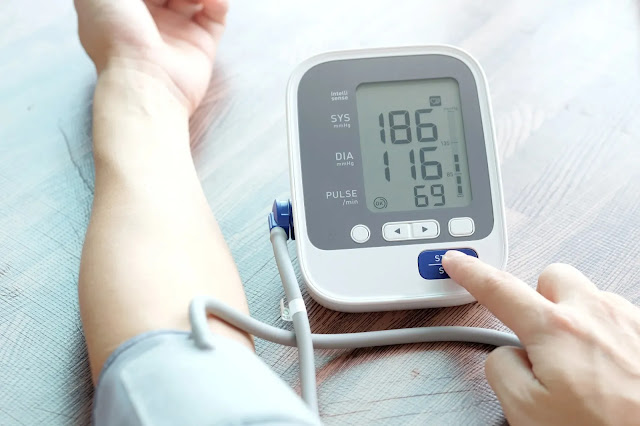High Blood Pressure: Causes,
Symptoms, and Treatments
High blood
pressure, also known as hypertension, is a condition where the force of blood
against the walls of your arteries is consistently too high. This can lead to
serious health problems, such as heart disease, stroke, and kidney failure. In
this article, we will explore the causes, symptoms, and treatments of high
blood pressure.
Causes of High Blood Pressure
High blood
pressure can be caused by a variety of factors, including genetics, lifestyle choices,
and underlying medical conditions. Some of the most common causes of high blood
pressure include:
1.
Genetics:
If high blood pressure runs in your family, you may be more likely to develop
it yourself. Research has shown that certain genes can contribute to the
development of high blood pressure.
2.
Obesity:
Being overweight or obese can increase your risk of developing high blood
pressure. This is because carrying extra weight puts extra strain on your heart
and blood vessels.
3.
Lack
of exercise: Regular physical activity can help keep your blood pressure in a
healthy range. If you don't exercise regularly, you may be more likely to
develop high blood pressure.
4.
Smoking:
Smoking can damage your blood vessels and increase your risk of developing high
blood pressure.
5.
Excessive
alcohol consumption: Drinking too much alcohol can increase your blood pressure
and damage your liver.
6.
Stress:
Chronic stress can cause your blood pressure to rise over time.
7.
Medical
conditions: Certain medical conditions, such as sleep apnea, kidney disease,
and thyroid disorders, can increase your risk of developing high blood
pressure.
Symptoms of High Blood Pressure
High blood
pressure is often called the "silent killer" because it often has no
symptoms. Many people with high blood pressure are unaware that they have it
until they experience a serious health problem, such as a heart attack or
stroke. However, in some cases, high blood pressure can cause symptoms such as:
1.
Headaches:
Some people with high blood pressure may experience frequent headaches,
especially in the back of the head.
2.
Dizziness:
If your blood pressure is very high, you may feel lightheaded or dizzy.
3.
Shortness
of breath: High blood pressure can make it harder to breathe, especially during
physical activity.
4.
Chest
pain: High blood pressure can cause chest pain, especially during physical
activity or emotional stress.
5.
Vision
problems: High blood pressure can cause vision problems, such as blurred vision
or seeing spots.
If you experience any of these symptoms, it is important to see a doctor right away. However, keep in mind that these symptoms can be caused by many other conditions as well, so it is important to get an accurate diagnosis from a healthcare professional.
Treatment of High Blood Pressure
If you have
high blood pressure, there are several things you can do to lower it and reduce
your risk of serious health problems. Here are some of the most effective
treatments for high blood pressure:
1.
Lifestyle
changes: Making healthy lifestyle changes can help lower your blood pressure.
This includes things like eating a healthy diet, exercising regularly, quitting
smoking, and limiting alcohol consumption.
2.
Medications:
There are several medications that can help lower blood pressure, including
diuretics, ACE inhibitors, beta blockers, and calcium channel blockers. Your
doctor can help you determine which medication is right for you.
3.
Blood
pressure monitors: Regularly monitoring your blood pressure at home can help
you keep track of your progress and make adjustments to your treatment plan as
needed.
4.
Stress
management: Managing stress through techniques such as meditation, yoga, or
deep breathing can help lower blood pressure.
5.
Surgery:
In some cases, surgery may be necessary to treat high blood pressure. This may
include procedures like renal denervation or bariatric surgery.





0 Comments